Issues and Analyses: Making The Case For Worker Cooperatives In Massachusetts
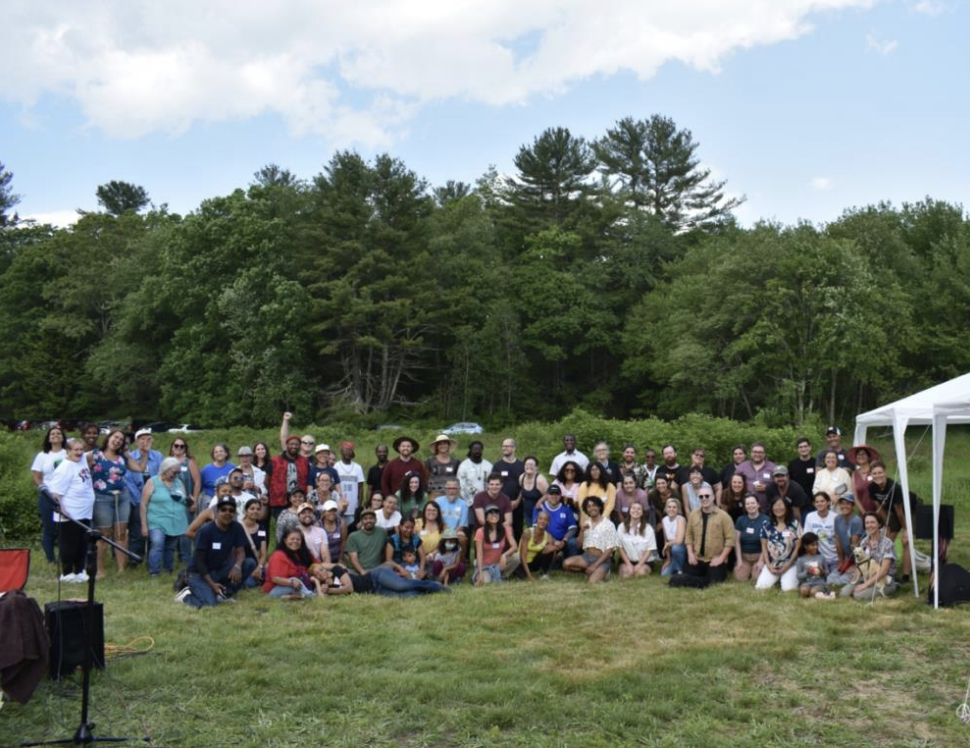
Participants at the 2022 Massachusetts Solidarity Economy gathering at Global Village in Grafton.
Becoming Human
Worker-owned cooperatives (WOC) are often positioned by their advocates as having many potential advantages and benefits for workers and communities. These range from the “economic”–cooperatives can create stable jobs and build wealth, to the social and political–WOC can democratize the economy; to the truly transformative–WOC can reorient how people want to live and be in the world.
In the United States, the research supporting these claims is sparse. As Massachusetts cooperative ecosystem grows, organizers and worker-owners are looking to existing research and conducting their own research in order to learn from each other, build relationships, and create the enabling conditions that can help WOC’s meet their community and world-changing promise.
Making the Case for Worker Cooperatives in Massachusetts
by Yumi Cruz, Prisha Dayal, Maddie Malkern, and Jeanne Grutchfield
“This report was produced by students in Anthropology 341 Building Solidarity Economies at the University of Massachusetts Amherst during the Spring and Summer of 2022 in collaboration with the Coalition of Worker Ownership and Power (COWOP). As part of the Making the Case pod, the four students who are the authors of this report, compiled and aggregated existing resources, and tracked down primary sources having to do with the benefits of worker-owned cooperatives. This research shows worker-owned cooperatives to be viable and transformative enterprises that can help create meaningful livelihoods and thriving, just communities.”
To access the full report along with a complete list of references, look here.
Introduction
Over the past few decades in the United States the number of worker-owned cooperatives has steadily grown and interest from economic developers, organizers, and communities has similarly increased and begun to coalesce. In Massachusetts, the number of worker- owned cooperatives continues to climb, general interest in worker-owned cooperatives is spreading and deepening, and a cooperative ecosystem is emerging.
It’s not a coincidence that efforts towards cooperative economies are intensifying during a prolonged period of social and economic crisis. As inequalities reach record levels, workers are refusing alienating and undignified work and seeking out good jobs. As wealth and power becomes more concentrated, communities are seeking to stabilize and democratize local economies. As baby boomers retire and age out of their businesses, policy-makers are looking for creative ways to keep those businesses thriving. And, as the violence of racial capitalism and depths of social injustice become more publicly acknowledged, BIPOC and other front-line communities are organizing for justice, autonomy, and well-being.
This report shows how worker-owned cooperatives are effective and essential responses to contemporary challenges and hardships, and it highlights how worker-owned cooperatives are being taken-up in each of the above contexts in Massachusetts. Cooperatives promote economic justice, can work against racism and for racial justice, can help to create resilient and thriving local economies with dignified jobs, and can build sustainable and healthy communities.
Now is the time for a worker-owned cooperative economy, and Massachusetts is the place.
Economic Justice
Worker-owners make decisions together about everything, including their own working conditions. The result is that cooperatives work against inequality and injustice within the businesses themselves. For example, the average pay ratio at a worker-owned co-op in the United States is 2-to-1 (from the highest to lowest paid worker). By comparison, CEOs of U.S. corporations are paid more than 350 times more than the average worker in the company.
Other research has shown that worker-owners tend to be paid more and treated better than employees of conventional firms. A 2021 report of a national survey found that worker-owners “earn higher wages and receive better benefits at their cooperative than they did at their previous job.”vi An exemplary case can be seen with Si Se Puede, whose worker-owners tripled their wages within four years of starting their house cleaning business. Members of the California-based Women’s Action to Gain Economic Security (WAGES) worker-cooperative “reported seeing a 70-80 percent increase in family income after joining the cooperative.” A study reports that the worker-owners of another such co- op in California, called Natural Home Cleaning increased their household income by 70 percent since they joined the cooperative.
In worker-owned cooperatives, this increased income is also joined with ownership of the business itself, enabling wealth building for individuals and communities who might have no other route towards ownership.
Wellspring Cooperative
Inspired in part by the anchor institution model of Evergreen Cooperatives in Cleveland and Mondragon Cooperatives in Spain, Wellspring Cooperative is building and connecting a network of worker-owned cooperatives in Springfield and WesternMassachusetts.
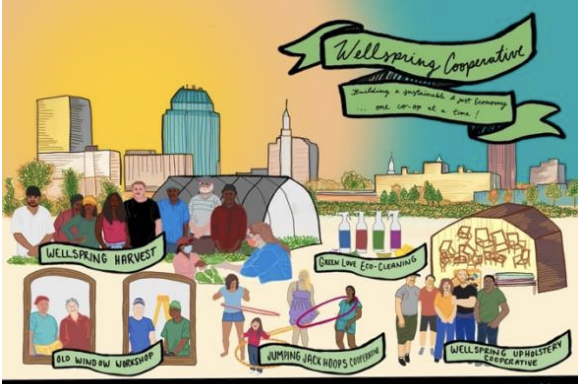
Wellspring Cooperatives include Wellspring Upholstery, Chronic Trips, Natural Living Landscapes, Jumping Jack Hoops, and Wellspring Harvest (pictured here), a commercial hydroponic greenhouse in Indian Orchard. Wellspring is a place- based effort, building community wealth and well-being in marginalized communities and growing the local economy by providing locally produced goods and services to anchor institutions and other local businesses.
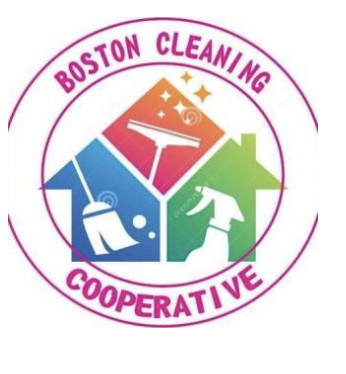
Boston Cleaning Collective
In an industry dominated by exploitative and alienating conditions, Boston Cleaning Collective (BCC) is creating dignified, empowered livelihoods. Launched in 2018 as a worker-owned cooperative, BCC provides full service, fully insured cleaning to houses in the greater Boston area. BCC “emerged from grassroots meetings of immigrant women exploring ways to support one another and build a new kind of economy”; worker-owners make decisions about the business together, pay each other living wages, and share in profits.
Racial Justice
Historically, cooperatives have played a central role in realizing racial justice. Racial capitalism thrives on a hierarchy of manufactured racial differences between people, which are then used to dehumanize and dispossess Black and brown folks all over the world. In the United States, Black and brown communities have responded in part through engaging in cooperative practices—and created worker-owned cooperatives—for both survival and liberation.
In the early days of captivity and forced labor, Afro-descended people in the South built communities amongst each other in order to survive; they worked together tilling small plots that provided families with a more diverse and nutritious diet. Black communities also collectively pooled wages in order to buy each other’s freedom. Throughout the 19th and 20th centuries Black credit unions, cooperative housing, cooperative businesses and agriculture, consumer cooperatives and purchasing groups were indelible features of black life.ix They were important sites to practice mutual aid and care, but also to bring attention to issues facing Black workers (of all kinds). Cooperative practices in Black history have created relations of care while building collective power.
Co-ops today continue as sites for fighting for and realizing racial justice.
In the United States, empirical studies around racial inequality in the worker-owned cooperative movement are rare, in part because this current resurgence of the cooperative movement is still in its infancy. But the deep history of cooperatives as part of Black struggle offers great promise. Racial capitalism continues to devalue the labor of Black and brown workers. In contrast, cooperatives are not only owned by workers, but can be spaces in which individuals and communities take ownership of their own labor. In 2020 nearly half of worker-owners were from BIPOC communities.
As experts of their own lives BIPOC communities themselves are publicly centering the importance of worker-owned cooperatives for individual livelihoods and community well- being. Black cooperative ecosystems are forming to strengthen Black leadership and participation in the movement. Finally, numerous worker-owned cooperatives are explicitly anti-racist and incorporate such practices into their foundational structures and missions.

The Compost Cooperative
The Compost Cooperative in Greenfield, MA is committed to taking on racial and environmental injustice through its mission and practice. Envisioned and developed by a group of incarcerated folks in the Franklin County jail, and with broad support from developers and funders of the cooperative ecosystem in Massachusetts, the Compost Cooperative builds “ownership and opportunity among people coming out of jail and others who face barriers to employment and are committed to providing affordable housing for our formerly incarcerated members.
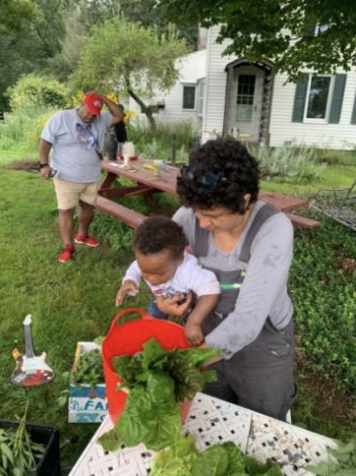
Global Village
Global Village Farms in Grafton, Massachusetts uses restorative agro-ecology methods and invites community participation through a CSA program, as well as volunteer education and work days. Global Village centers food justice in its work, developing programs that can “connect people from diverse backgrounds through food and farming to build community.” For example, and inspired by the efforts of Soul Fire Farm, Global Village is developing no-cost farm shares for food insecure folks. Global Village’s cooperative farm is part of a broader organizing and education project involving indigenous sovereignty and centering a “new sustainable economy and cooperative living spaces with low-income immigrant communities of color and other colonized and marginalized people.”
Local Economies
Worker-owned cooperatives create resilient, thriving local economies.
According to diverse sets of research conducted in the U.S. and abroad, worker-owned cooperatives tend to be just as productive and fare just as well, and often better, than conventional businesses.xiii Reasons for this are manifold: worker-owners are heavily invested in the success of their own business, collective ownership brings more problem-solving ability and creativity to decision making, and cooperatives create resilience by balancing the needs of the workers and the business.
In fact, worker-owned cooperatives and cooperatives in general might be less risky investments than conventional businesses.xiv They have high initial success rates and long-life spansxv. For example, one study found that the five-year survival rate for new cooperative businesses is 62%, especially impressive when compared to the 35% survival rate for all businesses.
Co-ops are stabilizing for local economies. Due to the cooperative ownership model, most of the revenue generated by worker-owned cooperatives goes back to the workers themselves, rather than corporate owners who might not bet tied to or directly participating in the local economy. For example, at Cooperative Homecare Associates, the largest worker-owned cooperative in the US, “approximately 82 cents of every dollar received as revenue is provided to its home health aides in the form of wages or benefits. Comparably, other home care agencies in New York City typically allocate 60 cents of every dollar as direct wages or benefits to workers.”
CERO (Cooperative Energy, Recycling, and Organics)
CERO is a commercial composting company in Dorchester. CERO is a multicultural, bilingual business that was founded by a “passionate group of Black and brown people from Boston neighborhoods who believe the way to a more equitable, healthy society is through a worker-owned solidarityeconomy.” Despite research to the contrary, cooperatives are sometimes viewed as riskier investments than conventional businesses. Overcoming this hurdle, CERO’s thriving, award-winning business was made possible in large measure through an initial Direct Public Offering that enabled everyday community members to invest in the business.
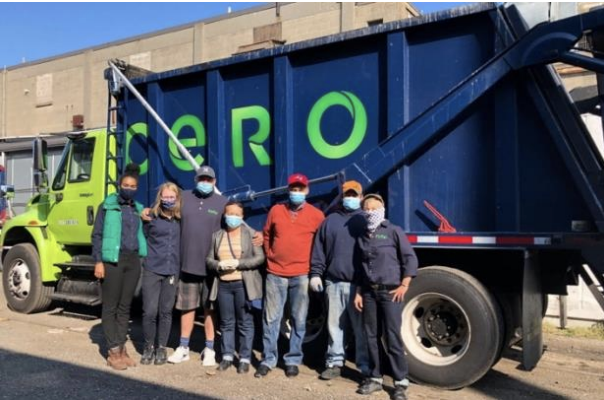

Democracy Brewing
Democracy Brewing is a brewery and pub in Downtown Boston. Open for lunch and dinner, Democracy Brewing offers locally crafted beers, appetizers, sandwiches, and entrees to locals and those traveling through. Worker-owned cooperatives create stability in the workplace, retaining employees and staying afloat during the riskiest parts of a company’s growth. During times of social crisis, too, cooperatives in generalxviii, and worker-owned cooperatives are more stable, keeping people working and cared for.xix For example, In the United States, during the pandemic in 2020, only 1/5 of worker-owned cooperatives lost more than 50% of revenue compared with nearly 1/3 of conventional firms. At the same time, worker-owned cooperatives prioritized employment despite losing some revenue.
Democracy Brewing aims to “brew the best beer in Boston, pair it with tasty food, and serve it to you in combination with two great American ideals: democracy and owning your own business.” Democracy Brewing is dedicated to building and connecting community by hosting community organizations, talks, fundraisers, and other community, arts, and cultural events as well as dedicating a percentage of profits towards growing other cooperative businesses.
Healthy Communities
Worker-owners care about each other and their communities. Members of worker-owned cooperatives are more likely to live near their work, and thus cooperatives tend to feel and act with a sense of accountability towards their community. And cooperatives themselves are more likely to be community minded than conventional businesses.
Worker-owned cooperatives create democracy and build community both within and outside of the workplace. Due to participating in cooperative business practices, and engaging in ongoing education, those in worker-owned cooperatives are more likely to be civically active than the general population. For example, worker-owners tend to be comparably more active in electoral politics.
This sense of and participation in community well-being may carry over into ecological care and responsibility as well. Because of their local, place-based orientation, worker- owned cooperatives, offer a response to globalized, industrial food and waste systemsxxii Other analyses argue that adherence to the seven cooperative principles aligns worker- owned cooperatives with ecological sensibilities.xxiii And, in Massachusetts, many worker- owned cooperatives do tend to be green, sustainable, or linked into local food systems (see break out boxes for examples).
Finally, worker-owned cooperatives offer psychological and emotional benefits that extend beyond the workplace, enabling worker-owners to better engage in and form caring relationships with those around them. Engaging in cooperative governance and decision-making can reorient and re-shape how work-owners imagine and act in the world.xxiv
People’s Market
On the campus of the University of Massachusetts Amherst, People’s Market is a student run cooperative selling foodstuffs to the campus community. People’s has been around for nearly 50 years,
and is one of seven student run cooperatives on campus. In addition to providing coffee, bagels, and
other daily goods to students, faculty, and staff, People’s
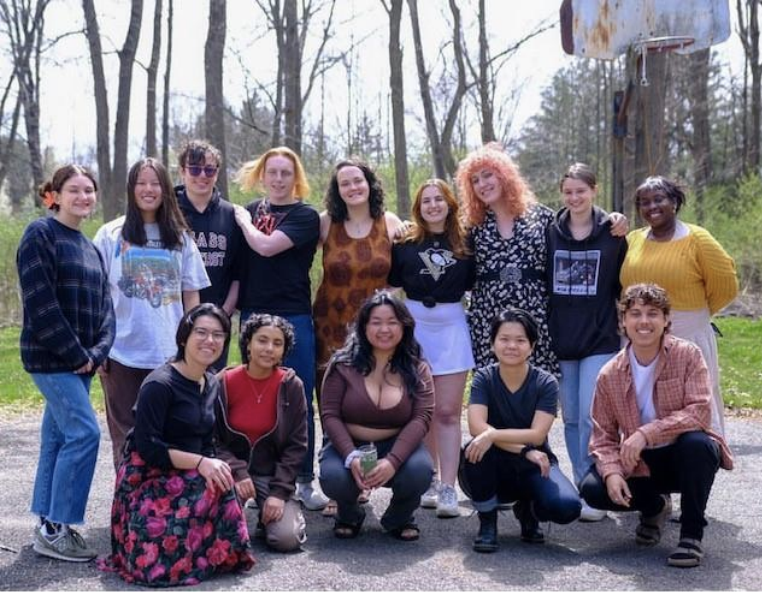
Market is a lifeline for many students, and is a center of community. For student workers, People’s is a training ground for the cooperative, solidarity economy enabling students to embody and participate in democracy, collective care, and joy. ”It’s difficult to put a finger on what exactly People’s Market has meant to me and my sense of community,” Marc, a graduating senior from the collective, expressed, “I came into college really longing for community and just happened to apply for the job. It changed my entire perception of what community can mean and look like. We are so intentional with each other, how we resolve conflict, how we delegate tasks, even with how we hang out. It’s a space where people can really grow and learn. I find myself looking for community like that everywhere I go and when I can’t find it, I try to build it.”
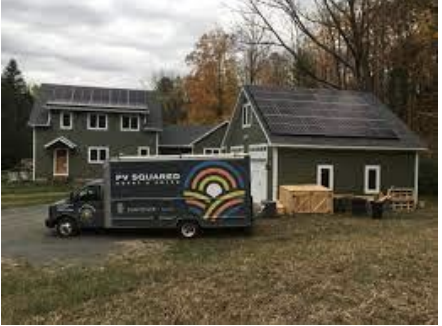
PV Squared
PV Squared designs, builds and installs solar energy projects for homes and businesses in Western Massachusetts and Southern VT. Founded in 2002 by four members, PV Squared is now owned by 29 workers. As a worker-owned cooperative PV Squared is invested in economic democracy and the well-being of workers and their communities. PV2 is also a Schedule B, mission drive business dedicated towards a transition towards renewable energy. PV2 has installed photovoltaic systems for “more than a thousand clients”, is active in the cooperative movement, and facilitates civic engagement and coalition building through its Community Committee
Conclusions
According to the US Federation of Worker Cooperatives, Massachusetts has the third most worker-owned cooperatives of any state in the U.S. There is great energy and interest in worker-owned cooperatives from individuals and communities who are responding to the impacts of an extractive economy. Massachusetts has a deep history with cooperative enterprises and has a growing ecosystem of organizations with expertise in co-op development, communities that are organizing around cooperatives, small businesses that are interested in worker-cooperative conversions, as well as the beginnings of institutional support from the state.
Still, a robust, cooperative economy in Massachusetts is very much on the horizon. State and local policies that direct resources, incentives, and attention towards communities and movements building cooperative economies can be instrumental in advancing racial and economic justice, can stabilize and grow local economies, and can build resilient sustainable communities.
Acknowledgements
The authors of this report would like to thank the entire Building Solidarity Economies class, especially our professor, Boone Shear. None of the work we have done would be possible without the amazing support and transformative conversations we had throughout the semester. Additionally, we would like to thank Stone Soup Cafe, Common Share Cooperative, and COWOP for their kindness and support in showing us what it means to be living the values we discuss and taking action to create a better world. Finally, to those reading our report right now, thank you so much for taking the time to dive into understanding the importance of cooperatives in Massachusetts.
Each edition of Becoming Human will feature an article, reflection, interview, poetry, or other types of expression that engage with a creative community or municipal effort. These will include original features that discuss a local initiative and also stories about efforts in other parts of the world that we might learn from. The growing narratives, relations, and power from which other worlds are being assembled, maybe, can help reorient our hope and desire—and resignation—away from the death drive of white supremacist, heteronormative, capitalist modernity, and towards an open, uncharted horizon of radical egalitarianism and towards the reality that other worlds are in the making or already here. For the full introduction to Becoming Human that appeared in its inaugural column, look here. For a listing a previous columns, look here.
Acknowledgements: This column is in dialogue and solidarity with numerous collaborators and comrades including Vin Lyon-Callo, Meredith Degyansky, Penn Loh, Stephen Healy, students in Anthropology 340 – Other Economies are Possible, Anthropology 341 Building Solidarity Economies, Anthropology 597CC Community, Commons, Communism, and the pluriverse of world-making and world-defending efforts, movements, and projects in Massachusetts and around the worlds.
